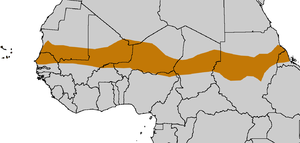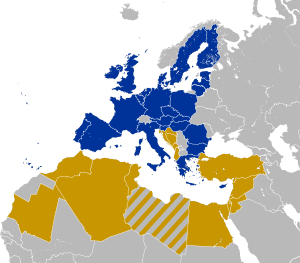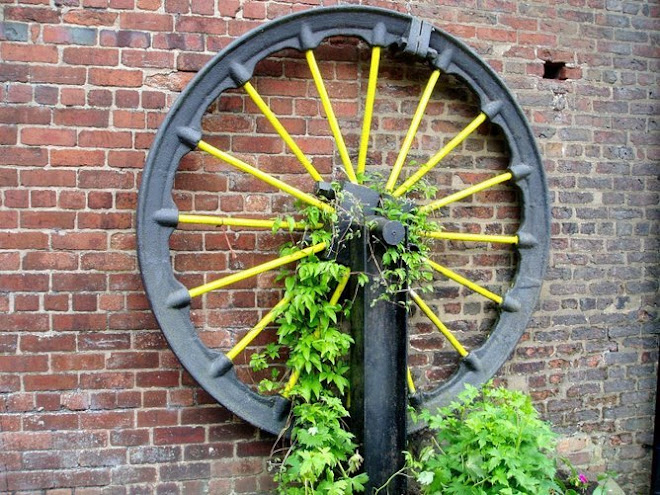Libya – the pariah in the EU’s Mediterranean Union plans
So the UK, a nation totally broke and in debt to the rest of the world in excess of £2 trillion, a nation that is running down its military capabilities, closing airbases, scrapping large swathes of its historic Royal Navy, and handing troops their P45′s whilst they are fighting in Afghanistan, has decided to embark on yet another war. We have to look behind the rhetoric and sound byte headlines and ask Why?
Following hard on the heels of Cameron doing a quick tour of the Middle East with his band of followers, a high powered gaggle of arms dealers, in the wake of unrest across the region from ‘democracy’ seekers, this military action is a methodology in action..
And it is that which set my mind a thinking. On the one hand the historical view that war always helps to raise a country out of recession, and on the other hand a need to understand where this sudden upsurge of interest for democracy has suddenly appeared from in the Arab states, something that has been puzzling me since I started closely following the events in Egypt.
I have arrived at the conclusion that the start of military action over Libya has nothing to do with the Cameron drafted UN mandate (we all know how the double speak of politics works, and I am old enough and cynical enough never to take the headline at face value), it has nothing to do with protecting the people from a wicked despot (we have heard that excuse before as well), but it does have everything to do with the fact
that Libya is not part of any of the organisations listed below, and if the EU is to export its kind of Communitarian ‘civil society’, its faux democracy, then those not in the club have to go, and it will also go a long way to reinforce the beginning of an EU military structure in action.
I believe that this action has long been in the planning, but required the right trigger mechanisms to play out before it could be put into action, i.e. Problem/Reaction/Solution. The removal of Mubarak was a consession, and allowing Saudi Arabia to ‘secure’ Bahrain was another, where a similar state killing spree is going on. The delay in beginning this military action was that until there was a ’20/20 Leader’ in the Libyan rebel camp the US would not endorse it. I believe seeking out that leader was part of the Hague ‘Diplomatic’ mission which went wrong, with the SBS contingent tasked with setting up the target markers.
It occurred to me that I have written about most of this before, but as isolated items. The massive EU funding running into many billions of euros in most of these states for ‘reforms’ in ‘civil society’ and ‘training’. A substantial amount of that training being provided, run, operated or funded by ‘Common Purpose’ or its South African affiliates, which to me accounts for this sudden urge from ‘the people’ of Arab states for democracy.
Then there is the
EU’s planned hegemony into Africa. Its renewed activity in The Union for the Mediterranean, under the Barcelona agreement promoted by…. Sarkozy, and its interest in an otherwise unknown geo-region called Sahel.
Back in October 2010 I wrote about The 3041st session of the Council of the European Union – FOREIGN AFFAIRS – will take place on 25 October 2010 (14.45), in the Conference Centre FIL – 5, Rue Carlo Hemmer, Luxembourg, under the presidency of Ms Catherine Ashton, High Representative of the Union for Foreign Affairs and Security Policy.
So lets take a look at what the unelected Ms Ashton will be discussing on behalf of the 500m EU ‘citizens’.
Here is
the agenda:
The following items will be discussed at this session:
- Sahel
- Middle East
- Cuba
- Summit preparations
a) EU-US (Lisbon, 20 November 2010)
b) EU-Ukraine (Brussels, 22 November 2010)
c) Union for the Mediterranean (Barcelona, 20-21 November 2010)
- Georgia
- European Neighbourhood Policy
The Sahel is the ecoclimatic and biogeographic zone of transition between the Sahara desert in the North and the Sudanian savannas in the south (the Arabic word, however, means any such transitional zone, e.g. in Algeria). It stretches across the north of the African continent between the Atlantic Ocean and the Red Sea. The Sahel covers parts of the countries of Senegal, Mauritania, Mali, Burkina Faso, Algeria, Niger, Nigeria, Chad, Sudan, Somalia, Ethiopia and Eritrea.
You may recall that this is the area in which the EU opened an
immigration centre (Mali) last year to allow a mixed bag of migrants from this region to relocate to the 27 member states of the EU.

However, reading a little deeper, it is also seen by the EU as an area “where a vicious cycle of poverty, political conflict, weak states, drug trafficking, terrorist groups and progressive Islamic radicalisation is increasingly taking hold” according to The European Parliament’s Committees on Security and Defence, Foreign Affairs and Development.
So two questions immediately spring to mind. A) What the hell has this region got to do with the EU, as surely this is covered by their own political regional body, the
African Union (the only African state not in the AU is Morocco)
and B) if this area is such a threat to security why is the EU promoting immigration from same.
The second question obviously makes no sense, until you get to the agenda item marked Union for the Mediterranean (Barcelona, 20-21 November 2010). Its about expanding the EU to take in not just those states who have indicated an interest, i.e. Iceland, Turkey, Israel etc, but also those states around the Mediterranean and down into the sub-sahara region whether they want EU interference or not.
So lets look at the Union for the Mediterranean. Firstly here is the official EU take on
EuroMed from the EEAS (the EU Foreign Affairs department run my Ms Ashton). Look innocuous enough, not really enough to raise an eyebrow.
Initially opposed by the EU and some members states as they saw it as nothing more than a move by the French to reestablish its colonial days in North Africa, it has this year taken on a new life.

It resurrected The Euro-Mediterranean Regional and Local Assembly, and the Euro-Mediterranean Parliamentary Assembly which consists of parliamentarians
appointed by:
* the national parliaments of the EU Member States;
* the national parliaments of the ten Mediterranean partners (Algeria, Egypt, Jordan, Israel, Lebanon, Morocco, Palestine, Syria, Tunisia and Turkey)
* the European Parliament.
The EMPA consists of a maximum of 240 Members, of which 120 are Europeans (75 from the EU national parliaments and 45 from the EP) and 120 are from the NPs of the EU’s Mediterranean partner countries, so as to guarantee North-South parity.
The Assembly’s inaugural meeting took place in Barcelona on 21 January 2010.
The Assembly provides a forum within the Union for the Mediterranean, to bring together members of the EU’s Committee of the Regions and their counterparts from the Mediterranean partner countries, with the aim of strengthening cooperation between local and regional authorities around the Mediterranean.
And lets not forget at this stage people, that every meeting, conference, plenary, dinner, event, report, payment, grant or award is paid for by you the taxpayer, whether that money is channel via Westminster or Brussels.
It appears that the EU is playing a dangerous game of hegemony, encroaching on the political zone currently overseen by the AU, (which you can see by its
political bodies is almost identical to the EU), and capitalising on the splits within that organisation, in search of what.
One thing that immediately springs to mind is Oil and Gas, and the EU seems prepared to embark on its own form of the War on Terror, whether real or perceived, using taxpayers money to bribe, cajole or threaten these states in order to acquire the rights to their mineral wealth.
Bring under the EU umbrella those states in the EuroMed zone where political influence is readily exchangeable for cash bribes and projects, and simultaneously extend the security borders of the EU to the Sahel region using the newly formed EU military structures in order to protect those Oil, Gas and mineral deposits.
The European Centre for Development Policy Management (
ECDPM) has all the clues in
its report, (which I understand will be discussed at the Ashton meeting) but lets be clear, EU funding for this is going to cost taxpayers dear, but the real cost, the human cost to sustain this kind of policy will make the use of military intervention inevitable.
It would appear to some that the EU wants to create its own form of Afghanistan in Africa in an attempt to bind Europe together. That may sound cynical, but expect to see in coming years North African immigrants becoming the patsies for this when the body bags start coming home.
Which brings me back to Morocco. Not being a member of the AU has meant that it has had to look elsewhere for its political and social development, and in many instances its security, and there are many who will say that it has already been bought lock stock and barrel by the EU.
But compliance with the overtures from the EU has its benefits for Morocco. Immigration from Morocco to the EU states is already the highest of any African state, and the
EU ‘investment’ in Morocco is currently running at many billions of €’s. There is talk of huge infrastructure projects being funded by the EU, least of which is
a road bridge between Morocco and Spain as part of the Euro-Med Transport policy.
I have to ask whether this kind of hedgemonistic policy by the EU is really in the long term interests of the UK, which again raises the question is our membership of the EU in our best interests.
http://pjcjournal.wordpress.com/2011/03/20/libya-the-pariah-in-the-eus-mediterranean-union-plans/
If you follow this link, then please do read the comments ... and follow those links too.
Morg
.





